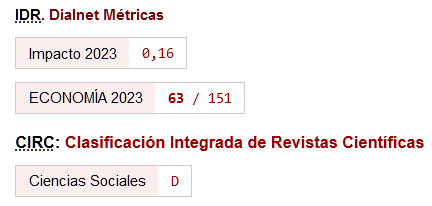La crisis en femenino plural.
Keywords:
economical crisis, gender perspective, labor market, public health, precarizationAbstract
This article examines the gender effects of the crisis, focused on the Spanish case. The article gathers the latest labour market’s statistics and identifies the key features of the women's working lives, identifying the characteristics which make women particularly vulnerable. From this point of view, its goal is to assess the impact of economic conditions in immigrant women and in women less than 25 years. In a broader perspective, the article takes into account the privatization’s trend of the basic services and the political restrictions that the "women friendly policies”, as the "Law of Dependency" is, are undergoing. From our point of view, an especially interesting section is the one which weighs up, from a gender perspective, the effects of the working life on health. Finally, founded on the ILO data, the paper sketches the likely of some actual employment of women’s trends and it suggests possible gender alternatives to the crisis
Downloads
References
Artazcoz, Lucía; Borrell, Carme; Cascant, Lorena; Cortès, Imma y Escribà-Agüir, Vicenta (2007): "Gender perspective in the analysis of the relationship between long work hours, health and health-related behavior", Scandinavian Journal of Work, Environment & Health Nº. 33 (5), pp. 344-350. https://doi.org/10.5271/sjweh.1154
Bakker, Isabella (1994): The Strategic Silence, Ottawa: The North-South Institute.
Balakrishnan, Radhika; Elson, Diane y Patel, Raj (2009): Rethinking Macro Economic Strategies from a Human Rights Perspective. http://www.ushrnetwork.org/files/ushrn/images/linkfiles/MES-II.pdf
Baquero, A.; González, S.; Placer, D. (2009): "La crisis expulsa més dones que homes immigrants", El Periódico de Catalunya. http://www.elperiodico.com/default.asp?idpublicacio_PK=46&idioma=CAT&idtipusrecurs_PK=7&idnoticia_PK=597815
Benería, Lourdes (2005): Género, Desarrollo y Globalización, Barcelona: Hacer.
Benería, Lourdes y Floro, Maria (2006): "Distribution, Gender and Labor Market Informalization: A Conceptual Framework with a Focus on Homeworkers," en S. Razawi y S. Hassim, (eds.) Gender and Social Policy in a Global Context: Uncovering the Gendered Structure of 'the Social', Basingstoke: Palgrave.
Benería, Lourdes (2008): "The economic crisis will most likely have effects that are not gender neutral," no publicado.
Bernhardt, Annette y Dresser, Laura (2002): Why Privatizing Government Services Would Hurt Women Workers, Center on Wisconsin Strategy: Institute for Women's Policy Research.
Borrell, Carme y Artazcoz, Lucía (2008): "Las desigualdades de género en salud: retos para el futuro", Revista Española de Salud Pública, Vol.82, Nº 3, pp. 241-249. https://doi.org/10.1590/S1135-57272008000300001
Borrell, Carme y Artazcoz, Lucía (2008): "Las políticas para disminuir las desigualdades en salud", Gaceta Sanitaria Nº 22 (5), pp.465-73. https://doi.org/10.1157/13126929
Bosch, Anna; Carrasco, Cristina y Grau, Elena (2006): "La Ley de Dependencia y el mito del Homo Economicus", en Revista de Economía Crítica, Nº 5, pp. 105-07.
Carrasco, Cristina; Alabart, Anna; Coco, Andrés; Domínguez, Màrius; Martínez i Castells, Àngels; Mayordomo, Maribel; Recio, Albert; Serrano, Mónica (2003): Tiempos, trabajos y flexibilidad: una cuestión de género. Madrid: Ministerio de Trabajo y Asuntos Sociales, Instituto de la Mujer.
Casanueva Artís, Annalí y Martínez Castells, Àngels (2009): "La crisi des d'una perspectiva de gènere" en Lluita Nº 193, pp. 3-4.
Comisión sobre Determinantes de Salud de la OMS (2009): "Subsanar las desigualdades en una generación". http://whqlibdoc.who.int/publications/2009/9789243563701_spa.pdf
Eagly, Alice y Carli, Linda (2007): Through the Labyrinth. The Truth About How Women Become Leaders, Boston: Harvard Business School Press.
Elson, Diane y Cagatay, Nilufer (2000): "The Social Content of Macroeconomic Policies", en World Development Report Nº 28(7), pp. 1347-64. https://doi.org/10.1016/S0305-750X(00)00021-8
Emmett, Bethan (2009): Paying the Price for the Economic Crisis, Boston: Oxfam International.
Eurostat Press Office (2010): News Release Indicators. http://epp.eurostat.ec.europa.eu/cache/ITY_PUBLIC/3-29012010-AP/EN/3-29012010-AP-EN.PDF
INE (2009): Encuesta de Población Activa (EPA), varias series. http://www.ine.es/jaxiBD/menu.do?L=0&divi=EPA&his=1&type=db
Juliano, Dolores; Parella, Sònia, et al. (2008): Dones Immigrades: Treball i Sindicat, Barcelona: Secretaria d'Immigració CC.OO. y CITE.
Lobby Europeo de Mujeres (2009): "Women and the Economic Crisis - An opportunity to assert another vision of the world?" http://www.womenlobby.org/site/1actions.asp?DocID=2514&v1ID=&RevID=&namePage=&pageParent=&DocID_sousmenu=
Martínez i Castells, Àngels (dir.) (2006): Estudi de gènere sobre el tancament d'empreses a Catalunya, Barcelona: Secretaria de la Dona CC.OO y ICD.
Martínez i Castells, Àngels (2009): ¿Puede sobrevivir la democracia al capitalismo financiero? El Viejo Topo, Nº. 253, pp.16-21.
Miralles-Guasch, Carme (2002): Ciudad y transporte: el binomio imperfecto, Barcelona: Ariel.
Organización Internacional del Trabajo (2009): Tendencias mundiales del empleo de la mujeres, Ginebra: OIT.
Palmer, Ingrid (1992): "Gender Equity and Economic Efficiency in Adjustment Programmes", en H. Afshar y C. Dennis (eds.) Women and Adjustment Policies in the Third World, Basingstoke: Macmillan pp.61-77. https://doi.org/10.1007/978-1-349-11961-5_4
Recio, Albert (2006): "La ley de dependencia: socialdemocracia demediada", en Revista de Economía Crítica, Nº. 5, pp. 109-12.
Torns, Teresa (2009): "Les dones i el treball a Catalunya: mites i certeses" en Lluita Nº 193, pp. 5-6.
UNIFEM (2008): El progreso de las mujeres en el mundo 2008/2009, ¿Quién responde a las mujeres? Género y rendición de cuentas. http://www.unifem.org/progress/2008/media/POWW08
Vanier, Etienne; Bogart, Jeroen; Tropic, Nikola (2009): Could the right man for the job be a woman? en http://www.hudson.com/documents/eu-hudsons-women-men-study.pdf
Downloads
Published
How to Cite
Issue
Section
License
This licence allows third parties to share (copy and redistribute the material in any medium or format) and adapt (remix, transform and create from the material for any purpose, including commercial purposes), provided that authorship and first publication in this journal (The Journal, DOI of the work) is acknowledged, a link to the licence is provided, and it is stated whether changes have been made to the work.







